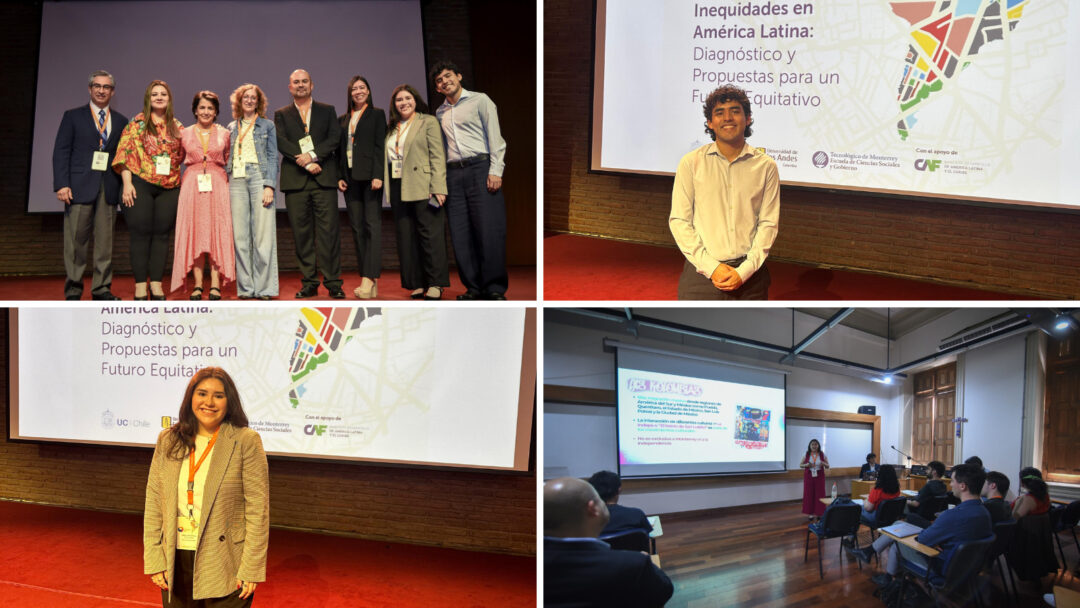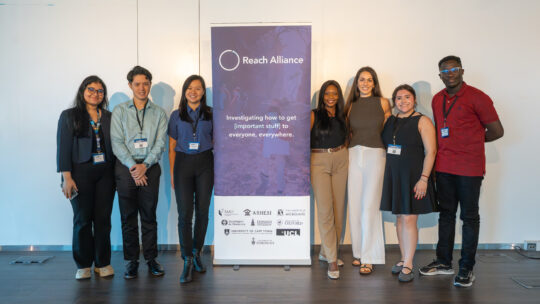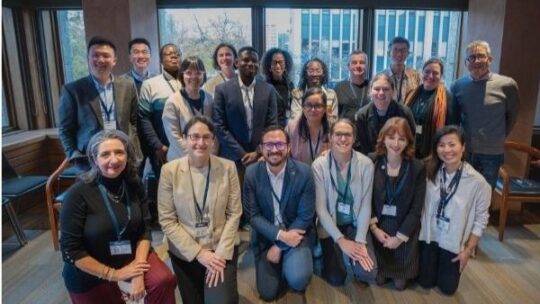News: Latest News
Building Bridges to Equity: Reflections on the 2nd Latin American Congress on Social Sciences and Government of the Triada 2024

Authors: Marla de la Cruz and Arturo Nepomuceno
From November 13 to 15, we participated as the only Tec de Monterrey undergraduate students in the 2nd Latin American Congress on Social Sciences and Government 2024 in Santiago, Chile. Centered on “Inequalities in Latin America: Diagnosis and Proposals for an Equitable Future,” the event gathered scholars, policymakers, and advocates to address the region’s pressing inequality. Key speakers included Michelle Bachelet, Chile’s first female president, who emphasized the urgent need for inclusive public policies to tackle inequality, and Francisco Ferreira, Amartya Sen Professor at the London School of Economics, who explored the intersection of wealth inequality and democratic fragility. Their contributions challenged us to rethink systemic barriers and inspired ground-breaking ideas on how collaboration can drive equity and sustainable development.
As undergraduate researchers, our attendance at this event was not only a learning opportunity but also a chance to deepen our understanding of how systemic inequality impacts marginalized communities, particularly through themes like democratic erosion, wealth inequality, and social exclusion. These insights enriched our perspective on our research, “Kolombia Regia: Social Vindication in the Face of Stigma and Violence in Monterrey,” and reinforced the importance of addressing intersectionality and community resilience in the fight for equity.
Intersectionality and the Identity of Kolombia
Kolombia Regia transcends subculture, embodying resistance to systemic inequities through music, art, and collective identity. Rooted in economic disparity, geographic stigmatization, and cultural resistance, it creates a space for marginalized individuals to reclaim their place in society. Kolombia women, in particular, challenge gender norms, fostering resilience and empowerment. Recognizing intersectionality highlights the community’s dynamism and underscores the need to address overlapping oppressions. This aligns with the Congress’s call to dismantle systemic barriers, especially for youth and marginalized groups, to build more equitable and democratic societies.
Democratic Erosion and Inequality
One of the Congress’s central themes was the rise of democratic erosion, characterized by polarization, distrust in institutions, and voter disillusionment, particularly among youth. In Latin America, inequality compounds these challenges, making democratic governance increasingly fragile. To combat this, it is essential to understand voting behaviors, as they reflect the motivations, frustrations, and priorities of citizens. By analyzing these patterns, we can identify and address the systemic barriers that discourage participation, such as inequitable access to education, misinformation, and economic precarity. Rebuilding trust in institutions requires responsive governance that acknowledges these barriers, empowers marginalized voices, and ensures policies that genuinely reflect the needs of all citizens, and particularly youth.
Our research on marginalized communities aligns with the Congress’s call to empower vulnerable populations, echoing Reach’s mission to advocate for inclusive policies that amplify voices in public decision– making and dismantling systemic barriers that discourage youth participation.
Corruption, Insecurity, and Wealth Inequality
Corruption and insecurity were identified as Latin America’s most pressing challenges, eroding public trust and perpetuating inequality by diverting resources from essential social programs and infrastructure. Wealth inequality remains stark, with nearly 50 per cent of the population relying solely on homeownership as their primary asset, highlighting the need for policies that promote economic mobility.
Our research in Monterrey’s Kolombia community emphasizes the pivotal role of social movements’ efforts in tackling systemic challenges. The Congress underlined how combining local solutions with structural changes can advance transparency, equity, and resource access, aligning with Reach’s focus on sustainable community development.
Collaboration for a Sustainable Future
Perhaps the most inspiring takeaway was the emphasis on collaboration to mitigate inequality in all its forms. Speakers stressed that creating a sustainable future for Latin America requires sharing resources, knowledge, and innovative strategies across nations. This approach resonates deeply with Reach’s mission to bridge gaps between academia, policy, and community action.
The Congress also shed light on the implicit exclusion perpetuated by elite educational institutions. Curricula tailored to affluent students and language barriers, such as English-only instruction, limit access for underprivileged populations. Addressing these inequities within education systems is crucial for fostering inclusive growth and empowering future generations — —a perspective we aim to integrate into our work.
A Renewed Commitment to Equity
In the Reach Alliance, our work — from documenting the lived experiences of marginalized communities to advocating for systemic change — feels more urgent than ever. The Congress underscored that inequality, in all its forms, is not just a statistic but a lived reality for millions. By integrating these lessons into our research and advocacy, we can build a more equitable and sustainable future for Latin America and beyond.


